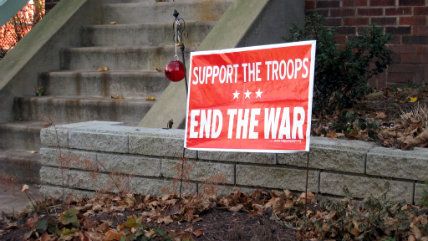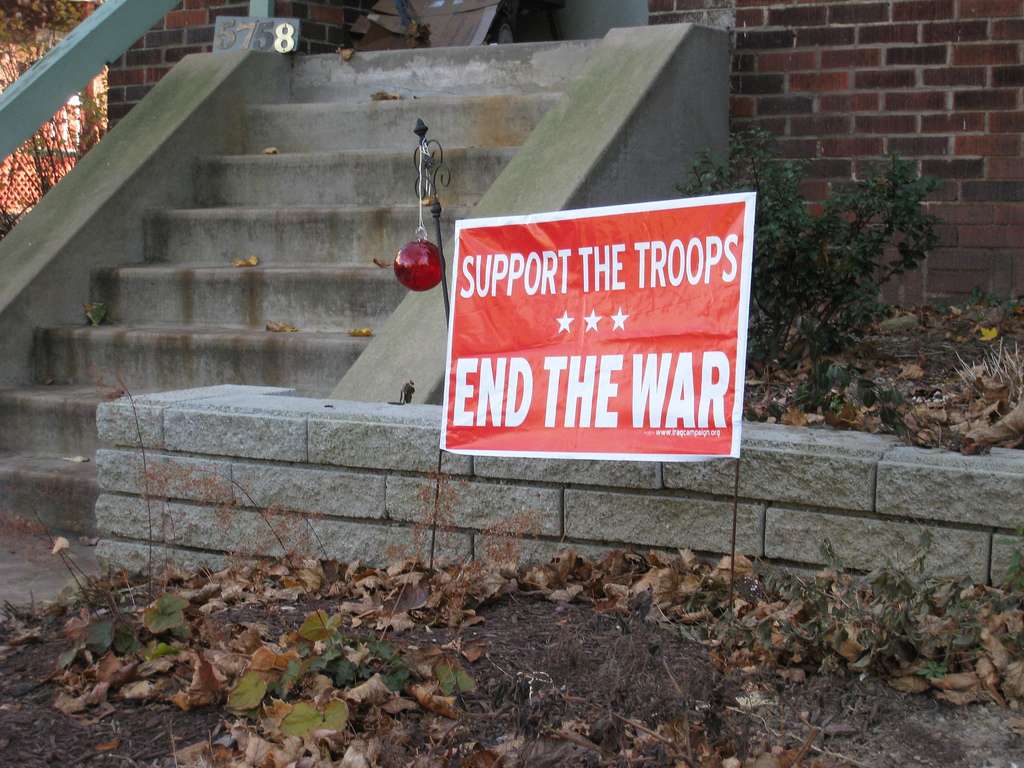Who Supports the Troops?
Where are their supporters before they are deployed to war?


A huge sign outside a local tire store really irritated me a couple of weeks ago. Its large letters blared: "WE SUPPORT THE TROOPS." I was tempted to get out of the car and demand that the owner tell me what he was actually doing besides displaying the sign, which probably didn't cost much in money or effort. I suspected that posting the sign was the extent of his "support," but I restrained myself and kept going.
I wonder if anyone ever asks the owner that question. Probably not. People seem to think that supporting the troops consists simply in displaying signs and bumper stickers, and perhaps suppressing negative thoughts about what those troops—including pilots—are doing in the far-flung locations to which the imperial ruling elite has dispatched them, That's all you need to do to be a citizen in good standing of the Empire—that and pay your taxes on time. It's funny because supporting the troops and declaring you support the troops don't really seem to be the same thing. I can imagine a conversation:
Troop supporter: I support the troops!
Interlocutor: Okay, let's see how you support the troops.
Troop supporter: You just did.
Interlocutor: I just did what?
Troop supporter: You just saw me support the troops.
Interlocutor: No I didn't. I heard you say you support the troopers.
Trooper supporter: That's right.
Interlocutor: Okay, then. Let's see how you support the troops.
Troop supporter: You just did!
Interlocutor: No I didn't. All I saw was you saying you support the troops. I want to see you actually support the troops.
Troop supporter: That's how I support the troops.
Interlocutor: To support means to assist. How does your empty declaration of support assist the troops?
Troop supporter: Why don't you support the troops? Don't you love your country?
What's strange is that demanding an end to the wars in which the troops are fighting, killing, and dying seems not to count as support. You'd think that the ultimate expression of support would be, "Bring them home now!" But that's not how typical troop supporters see things. In fact, they think that's the opposite of support—and even treason. Topsy-turvy.
While I believe their expressions of support are sincere, I also believe they haven't thought things through. Good intentions aren't enough. Their expressions in effect are only in support of the regime that moves the troops to dangerous spots on the map like pawns on a chessboard in the ruling elite's geopolitical games.
I concede that opposing the wars—how many are there today?—is also little more than a declaration not backed by much action and therefore without immediate effect. However, I see a difference. To the extent that declarations of support for the troops reinforce the government's militarism, it endangers those troops, and those not currently deployed—and that really doesn't seem much like support. In my book, merely making the troops feel better about what they are doing (if that is indeed the effect) doesn't count as actual support.
On the other hand, to the extent that antiwar declarations and public activities such as demonstrations change government policy for the better, the troops are that much closer to safety. That, I submit, would be of help to the troops.
So who really supports them: those who merely say they support them while refusing to criticize the militarism that imperils them, or those who vocally oppose militarism while trying to convince families, friends, neighbors, and total strangers to join them in opposition?
At some point during a discussion with an avowed troop supporter, the matter of morale may come up. "I support the troops but not necessarily the wars," he might say. "We've got to keep the troops' morale up while they are away from home serving our country."
Why do we want their morale high while they are carrying out immoral orders—which does not serve the country but only the regime? Remember, American troops are fighting aggressive undeclared wars—in one manner or another—in more than half a dozen countries, roughly from Somalia up to Syria and over to Pakistan. Heaven knows where else the CIA (do their agents count as troops?) and special-ops forces are? American military personnel—including drone operators—routinely kill and injure noncombatants. As we know too well, even hospitals and wedding parties are bombed.
Perhaps if the troops' morale was low, they'd refuse to do the immoral things they do, like raiding homes, operating killer drones, and flying bombers and gunships. Perhaps they'd like to know that some Americans disapprove of what they are doing. Some of the troops know that what they are doing is wrong. What about their morale?
I know: they're just following orders. Does anyone still think that's a valid excuse? One has no obligation to follow an immoral order.
To be fair, troop supporters may do more than merely express their views. They may send money to the Wounded Warrior Project or a similar organization. I guess that's nice, but I can't help thinking that for the mangled beneficiaries, the help comes a little late. Where were their supporters before they were deployed to hell?
This piece originally appeared at Richman's "Free Association" blog.


Show Comments (262)